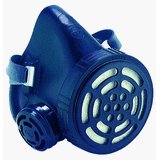
Never say "no" to a dust mask. Among woodworkers, the chances of developing nasal and sinus cancer run up to 40 times greater than non-woodworkers. Although researchers haven't identified the exact cancer-causing compound, some evidence points to the dust generated from sanding wood with a high tannin content, such as chestnut, redwood, western red cedar, hemlock and oak!
Always use the dust collection option on your sanders and work in a well ventilated area. The inhalation of fine wood dust from sanding can have many effects on the respiratory tract, including: a runny nose, violent sneezing, stuffed up nose, nose bleeds and even nasal cancer. Asthma is another concern...most wood dusts can irritate the respiratory tract provoking asthma attacks in those individuals that develop allergies to wood dust.
For information on Wood Toxicity, check out the following links:
1. www.woodturner.org and look under "Resources"
2. Greater Vancouver Woodturners Guild Wood/Dust Toxicity Article
If you are interested in purchasing a new dust mask or respirator--do your research. Face masks depend on good contact between the skin and the mask for their effectiveness, and you want to find a style that is comfortable to work in! A few of our customers have recommended the masks made by www.aosafety.com
For more information on sanding and sanding products, check out our website
www.abrasiveresource.com
